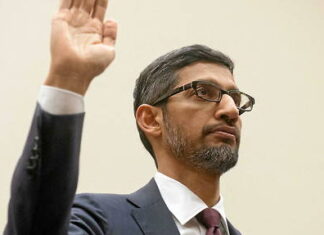It’s a birthday present that Google could have done without. Twenty-five years, almost to the day, after its founding on September 4, 1998, the web giant must face the Biden administration in an extraordinary trial before a federal court in Washington DC.
The debates will open this Tuesday, September 12 and will last ten weeks. One hundred and fifty people are called to testify, according to the New York Times. Including the CEO of Google himself, Sundar Pichai. The company has retained the advice of lawyers who are members of two of the best firms in the world.
These are the agreements between Google and several smartphone manufacturers, including Apple, Samsung and Motorola, which are the subject of the wrath of the Justice Department. These agreements allow Google to be the default search engine for these devices. In exchange, Google pays high remuneration to these companies. The same arrangement was made with the Mozilla Firefox browser.
For its part, Google maintains that it is the superiority of its product which explains its hegemony. “Their search engine is the best,” Tim Cook, Apple CEO, also explained when the American online news site Axios asked him at the end of 2018 why he had partnered with Google.
As proof that it is indeed consumers who choose their search engine, Google highlights the fact that any Internet user has the possibility of sticking their nose into their browser settings to change them.
If Google loses, the court could force it to pay significant damages. In Europe, Google is accumulating fines for various violations of community competition law. Since 2017, the group, whose parent company, Alphabet, made a net profit of $15 billion worldwide in the first quarter of 2023, has been subject to more than €8 billion in financial sanctions.
Google could also be ordered by judges to cease its agreements regarding its search engine. In particular its agreement with Apple. Would this reduce the number of Google search users? Nothing is less sure. Google was already condemned in 2018 by the European Union for the same reasons. Since then, each European user of an Android smartphone has been asked, when turning on the device for the first time, to choose which search engine they wish to install. However, Google’s predominance has not been impacted.
The Justice Department is also suing Google in another anticompetitive practices case. This concerns the group’s activities in the online advertising technology sector. The trial will begin in 2024.


















